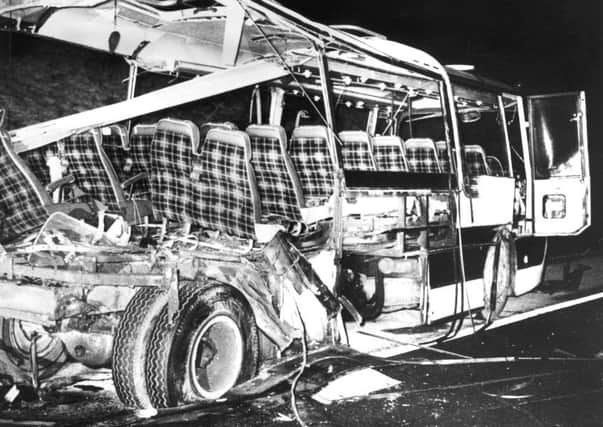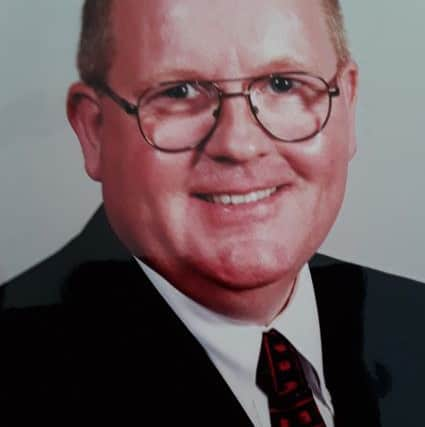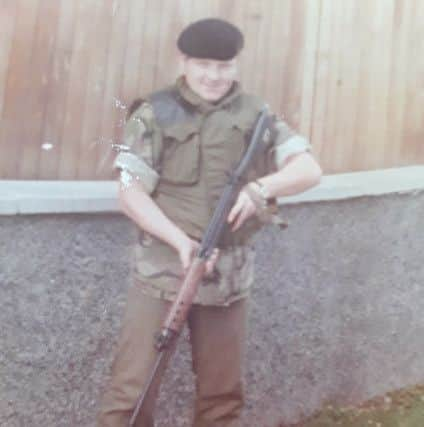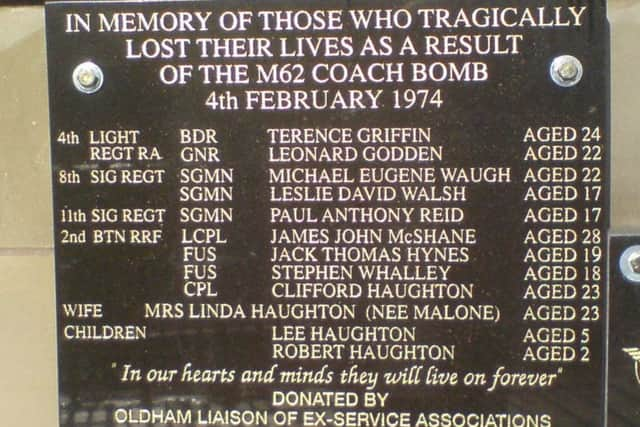M62: I didn’t get to sit on bomb as I was late for coach


Twelve people were killed in the attack 45 years ago today, including a family of four, and at least another 12 people were seriously injured, including a young boy who suffered serious burns.
Tommy Judge was a young soldier who hoped to stretch out on the back seat of the civilian coach which was taking servicemen and their families from Manchester back to their barracks in Catterick after weekend leave.
Advertisement
Hide AdAdvertisement
Hide AdYesterday he attended a special commemoration for the victims at a memorial near the bomb site.


But instead of lying down for several hours sleep on the back seat, a crestfallen Tommy was resigned to trying to get comfortable in a regular seat when he saw Cpl Clifford Haughton and his wife Linda, both 23, and their two young sons Lee, five, and Robert, two, already taking up the back row.
What none of them realised was that a deadly 50lb IRA bomb was right under the young family in the boot. Just after midnight it would cause an explosion near Bradford that would be heard miles away, tearing off the back of the coach and leaving the dead, dying and injured strewn 250 yards down the motorway.
The others who died were Cpl Terence Griffin, 24, Gunner Leonard Godden, 22, Signalman Michael Waugh, 23, Signalman Leslie Walsh, 17, Signalman Paul Reid, 17, L/Cpl James McShane, 29, Fusilier Jack Hynes, 20, and Fusilier Stephen Whalley, 18.
Advertisement
Hide AdAdvertisement
Hide AdBut Tommy, now a Labour councillor in Manchester, walked away physically unscathed.


“I feel extremely lucky,” he told the News Letter. “My idea was to go early to get on the back of the coach to get my head down and go to sleep.
“I got there late and was unable to do that and that decision was probably to save my life. It is pure chance and good fortune.”
Advertisement
Hide AdAdvertisement
Hide AdBut despite walking away without any physical injuries, the screams, smells and sights of the horrific night have still had a lasting impact.


“Every day I will have a thought or an image that comes to me that I am currently able to ‘click’ on and get on with something else and move on with something.
“But it is something I will never forget.”
He was sat about half way down the coach and tried to wedge himself in a regular seat to get comfortable.
“I must have nodded off and then I woke up. The driver had Radio 2 going. I woke up and it was the news at midnight and then shortly after that it was just a flash and an explosion, though I didn’t realise it was an explosion.
Advertisement
Hide AdAdvertisement
Hide Ad“By the time I got my composure together and stood up – I had to be careful because there was no floor underneath me.”
He witnessed injured people in great distress and with the most serious injuries.
“That is the type of thing that I still hear and see.”
“There were 12 fatalities but it could have been even worse if the coach driver had not got us into the hard shoulder and stopped. His face was covered in blood where the windscreen had gone and he was hit by flying glass.”
But the laughter and cries of tiring children on the back seat of the coach will forever haunt him.
Advertisement
Hide AdAdvertisement
Hide AdAfter the bomb the entire back of the bus disappeared, and the family and their children with it.
Clifford Haughton and his wife Linda and their boys Lee and Robert were sitting on the back seat. The IRA bomb was right under them in the luggage compartment and exploded just after midnight.
“That is one thing that I will never forget,” Tommy said.
“The real difficult thing for me after that was I didn’t hear the laughter any longer, I didn’t hear the crying. And that brought it home to you that there is something seriously wrong here.”
He made his way round to the back of the bus.
“Prior to the explosion I was listening to children laughing and crying. And then after the explosion there was no sound of the children. There was nothing there.
Advertisement
Hide AdAdvertisement
Hide Ad“The back seat of the bus had disappeared. And that is when it really started to hit home.”
The family of four were all killed instantly.
More than a dozen people who survived the carnage of the bombing would later die prematurely as a result of the trauma, police told Tommy.
Labour councillor Tommy Judge, who was a 17-year-old soldier on the coach, would be visited by police in 1992 to warn him that a woman who had been convicted for the atrocity was to be released early.
Judith Ward was jailed in 1974 after a serious of confessions but an appeal in 1992 found she had been wrongly convicted.
Advertisement
Hide AdAdvertisement
Hide AdThe policeman who visited Tommy in his home to let him know told him: “Tommy, you have done really well for yourself. You have a beautiful home, beautiful kids and you have done really well. I will let you into something now, there are more people who have died prematurely since the explosion than were actually killed in the explosion.”
As the coach was chartered for servicemen and their families, their average age would presumably have been quite low. The soldiers who died were mainly in their early 20s, several in their teens.
With 12 fatalities from the bomb, that means that over a dozen such service personnel who survived died within 18 years of the bomb, when many of them might have been reaching around 40 years of age.
“He said they had died from drink, drugs or people just giving up,” Tommy said. “That brought it home to me then about the impact of this on the mental health and wellbeing of people who had been on there.”
Advertisement
Hide AdAdvertisement
Hide AdTommy says says it did not matter to the IRA that his mother and father were both Irish Catholics from the Republic.
“I had a uniform and understand that I was a target but there were kids on there and they weren’t targets,” he said.
“In any conflict around the world it is the innocent who get killed and it isn’t right.
“I could be eaten up by hatred but my father is Irish and my mother is Irish so I am the first generation in this country.”
Advertisement
Hide AdAdvertisement
Hide AdHis father came from Cullfadda Ballymoats, Co Sligo and his mother is from Co Kildare.
His dad took him down to catch the coach on the night of the bomb.
“He died shortly after that. I don’t know if he was a victim of it more than I was, because he developed cancer and died a couple of years after the bombing.
“I never had the conversation with him but I could imagine if it was my son – I have a son now – dad put me on the bus and he walked away.
Advertisement
Hide AdAdvertisement
Hide Ad“As a parent now myself I can only imagine what he must have gone through and it mustn’t have been very nice.
“But I never sat down and had that conversation with him.”
They were a Catholic family.
His father was very grateful he escaped uninjured but they never discussed it.
“He probably went to church and said a few extra prayers to deal with it.”
Tommy decided to leave the Army after escaping injury in another bomb attack while on duty in Portadown two years later, in 1976.
Advertisement
Hide AdAdvertisement
Hide AdThe regular flashbacks of the M62 bomb he suffers could fit a post traumatic stress disorder diagnosis. Mental health charity, Combat Stress recently advised him that the day might come when he is not able to dismiss the flashbacks as easily as he currently does.
“Thankfully I have that information so if that happens I would go and seek help.”